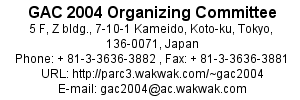GAC 2004 Tokyo Declaration
21 November 2004
21 November 2004
The Participants of the Global Asbestos Congress 2004 in Tokyo (GAC2004) gathering from 40 countries and regions all over the world from 19-21, November 2004, issue the following appeal to governments, organizations, groups and people in view of the devastating health effects of all forms of asbestos, a proven carcinogen. Highlighting international initiatives for eliminating asbestos risks, participants agree to take urgent action to intensify these initiatives.
1 Ban:
Ban on asbestos mining, use, trade and recycling should be adopted by all the countries. Safe removal and disposal of asbestos must be carried out according to established rules and procedures.
2 Protection of workers and the public:
Workers and the public who may be exposed to products containing asbestos must be protected by means of adequate risk management procedures developed with the active participation of these people. The rehabilitation of environmentally damaged areas should be a priority.
3 Alternatives:
Alternatives replacing asbestos should be used with due attention to their less harmful nature and feasibility of such alternatives.
4 Information exchange:
Ready-to-use information materials should be developed and disseminated by collaborative efforts of international agencies, concerned organizations and interested groups. Awareness raising campaigns must be undertaken continually and systematically.
5 Just transition and preventing the transfer to countries in industrial development:
Every effort should be made to secure a just transition and social protection for workers and communities affected by asbestos bans. Any transfer of asbestos production and asbestos containing products and wastes to countries in industrial development must be prevented by joint efforts.
6 Compensation and treatment:
Asbestos victims and their families must have prompt medical treatment and equitable compensation. Empowerment of the victims and their families in participating in local campaigns and taking direct action should be given a high priority.
7 Cooperation of people:
International cooperation is essential! Active participation of victims, workers, the public, policy makers, academics, lawyers, trade unions, grassroots organizations, relevant agencies and interested groups is needed. Positive experiences of this cooperation should be exchanged through existing and innovative networks.
Continual and global monitoring of developments in all the categories above is vital for sustaining international action toward asbestos-free environment for all the human family. We can, must and WILL make a change working together for the future.
